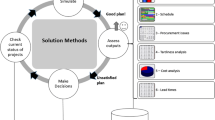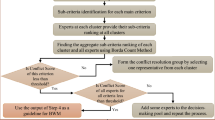Abstract
In this paper, the multi-mode resource constrained project scheduling problem with discounted cash flows is considered. The objective is the maximization of the net present value of all cash flows. Time value of money is taken into consideration, and cash in- and out-flows are associated with activities and/or events. The resources can be of renewable, nonrenewable, and doubly constrained resource types. Four payment models are considered: lump sum payment at the terminal event, payments at prespecified event nodes, payments at prespecified time points and progress payments. For finding solutions to problems proposed, a genetic algorithm (GA) approach is employed, which uses a special crossover operator that can exploit the multi-component nature of the problem. The models are investigated at the hand of an example problem. Sensitivity analyses are performed over the mark up and the discount rate. A set of 93 problems from literature are solved under the four different payment models and resource type combinations with the GA approach employed resulting in satisfactory computation times. The GA approach is compared with a domain specific heuristic for the lump sum payment case with renewable resources and is shown to outperform it.
Similar content being viewed by others
References
S.M. Baroum and J.H. Patterson, An exact solution procedure for maximizing the net present value of a project, in: Handbook on Recent Advances in Project Scheduling, ed. J. W?glarz (Kluwer Academic, 1999).
R.B. Bey, R.H. Doersch and J.H. Patterson, The net present value criterion: its impact on project scheduling, Project Management Quarterly 12 (1981) 223–233.
J. Blazewicz, J.K. Lenstra and A.H.G. Rinnooy Kan, Scheduling subject to resource constraints: classification and complexity, Discrete Applied Mathematics 5 (1983) 11–24.
N. Dayanand and R. Padman, Payments in projects: A contractor's model, Working Paper 93-71, The Heinz School, Carnegie Mellon University, Pittsburgh, PA (1993).
N. Dayanand and R. Padman, A simulated annealing approach for scheduling payments in projects, Working Paper 94-40, The Heinz School, Carnegie Mellon University, Pittsburgh, PA (1994).
N. Dayanand and R. Padman, On modelling payments in projects, Journal of the Operational Research Society 48 (1997) 906–918.
N. Dayanand and R. Padman, Project contracts and payment schedules: The client's problem, Working Paper, The Heinz School, Carnegie Mellon University, Pittsburgh, PA (1998).
N. Dayanand and R. Padman, On payment schedules in contractor client negotiations in projects: An overview of the problem and research issues, in: Handbook on Recent Advances in Project Scheduling, ed. J. W?glarz (Kluwer Academic, 1999) pp. 477-508.
R.H. Doersch and J.H. Patterson, Scheduling a project to maximize its present value: A zero-one programming approach, Management Science 23 (1977) 882–889.
A. Drexl and J. Grünewald, Nonpreemptive multi-mode resource constrained project scheduling, IIE Transactions 25 (1993) 74–81.
S.E. Elmaghraby and W.S. Herroelen, The scheduling of activities to maximize the net present value of projects, European Journal of Operational Research 49 (1990) 35–40.
D.E. Goldberg, Genetic Algorithms in Search, Optimization & Machine Learning (Addison-Wesley, 1989).
J.J. Grefenstette, Optimization of control parameters for genetic algorithms, IEEE Transactions on Systems, Man, and Cybernetics SMC-16 (1986) 122–128.
R.C. Grinold, The payment scheduling problem, Naval Research Logistics Quarterly 9 (1972) 123–136.
S. Hartmann, Project scheduling with multiple modes: A genetic algorithm, Technical Report 435, Manuskripte aus den Instituten für Betriebswirtschaftslehre der Universitaet Kiel, Kiel, Germany (1997).
S. Hartmann, A competitive genetic algorithm for resource-constrained project scheduling, Naval Research Logistics 45 (1998) 733–750.
W.S. Herroelen, B. De Reyck and E.L. Demeulemeester, Project network models with discounted cash flows: A guided tour through recent developments, European Journal of Operational Research 100 (1997) 97–121.
W.S. Herroelen, E.L. Demeulemeester and B. De Reyck, A classification scheme for project scheduling, in: Handbook on Recent Advances in Project Scheduling, ed. J. W?glarz (Kluwer Academic, 1999) pp. 1-26.
W.S. Herroelen, P. van Dommelen and E.L. Demeulemeester, Resource-constrained project scheduling: A survey of recent developments, Computers and Operations Research 25 (1998) 279–302.
J.H. Holland, Adaptation in Natural and Artificial Systems (The University of Michigan Press, Ann Arbor, 1975).
O. Icmeli and S.S. Erenguc, A branch-and-bound procedure for the resource-constrained project scheduling with discounted cash flows, Management Science 42 (1996) 1395–1408.
B. Kazaz and C. Sepil, Project scheduling with discounted cash flows and progress payments, Journal of the Operational Research Society 47 (1996) 1262–1272.
M. Khattab and F. Choobineh, A new approach for project scheduling with a limited resource, International Journal of Production Research 29 (1991) 185–198.
R. Kolisch, Project Scheduling under Resource Constraints (Physica-Verlag, Heidelberg, 1995).
R. Kolisch and R. Padman, An integrated survey of project scheduling, Technical Report 463, Manuskripte aus den Instituten für Betriebswirtschaftslehre der Universität Kiel, Kiel, Germany (1998).
J.-K. Lee and Y.-D. Kim, Search heuristics for resource constrained project scheduling, Journal of the Operational Research Society 47 (1996) 678–689.
K.Y. Li and R.J. Willis, An iterative scheduling technique for resource-constrained project scheduling, European Journal of Operational Research 56 (1992) 370–379.
M. Mori and C.C. Tseng, A genetic algorithm for multi-mode resource constrained project scheduling problem, European Journal of Operational Research 100 (1997) 134–141.
L. Özdamar, A genetic algorithm approach to a general category project scheduling problem, IEEE Trans. Systems, Man and Cybernetics, Part C: Applications and Reviews 29(1) (1999) 44–59.
L. Özdamar and G. Ulusoy, A survey on the resource-constrained project scheduling problem, IIE Transactions 27 (1995) 574–586.
R. Padman and D.E. Smith-Daniels, Early-tardy cost trade-offs in resource constrained projects with cash flows: An optimization guided heuristic approach, European Journal of Operational Research 64 (1993) 295–311.
A.H. Russell, Cash flows in networks, Management Science 16 (1970) 357–373.
R.A. Russell, A comparison of heuristics for scheduling projects with cash flows and resource restrictions, Management Science 32 (1986) 291–300.
C. Sepil and N. Ortac, Performance of the heuristic procedures for constrained projects with progress payments, Journal of the Operational Research Society 48 (1997) 1123–1130.
F. Sivrikaya-?erifo?lu, A new uniform order-based crossover operator for genetic algorithm applications to multi-component combinatorial optimization problems, Unpublished Ph.D. Dissertation, Bo?aziçi University, Istanbul (1997).
F. Sivrikaya-?erifo?lu, A new uniform order-based crossover for concurrent consideration of sequencing and selection problems, Working Paper, Abant ?zzet Baysal University, Bolu, Turkey (1998).
F. Sivrikaya-?erifo?lu and G. Ulusoy, Parallel machine scheduling with earliness and tardiness penalties, Computers and Operations Research 26 (1999) 773–787.
R. Slowinski, Two approaches to problems of resource allocation among project activities-a comparative study, Journal of the Operational Research Society 31 (1980) 711–723.
D.E. Smith-Daniels and N.J. Aquilano, Using a late start resource constrained project schedule to improve project net present value, Decision Sciences 18 (1987) 617–630.
G. Ulusoy and L. Özdamar, Heuristic performance and network/resource characteristics in resourceconstrained project scheduling, Journal of Operational Research Society 40 (1989) 1145–1152.
G. Ulusoy and L. Özdamar, A constraint-based perspective in resource constrained project scheduling, International Journal of Production Research 32 (1994) 693–705.
G. Ulusoy and L. Özdamar, A heuristic scheduling algorithm for improving the duration and net present value of a project, International Journal of Operations & Production Management 15 (1995) 89–98.
G. Ulusoy and S. Cebelli, An equitable approach to the payment scheduling problem in project management, European Journal of Operational Research 127 (2000) 262–278.
G. Ulusoy, F. Sivrikaya-?erifo?lu and Ñ. Bilge, A genetic algorithm approach to the simultaneous scheduling of machines and automated guided vehicles, Computers and Operations Research 24 (1997) 335–351.
Author information
Authors and Affiliations
Rights and permissions
About this article
Cite this article
Ulusoy, G., Sivrikaya-Şerifoğlu, F. & Şahin, Ş. Four Payment Models for the Multi-Mode Resource Constrained Project Scheduling Problem with Discounted Cash Flows. Annals of Operations Research 102, 237–261 (2001). https://doi.org/10.1023/A:1010914417817
Issue Date:
DOI: https://doi.org/10.1023/A:1010914417817




